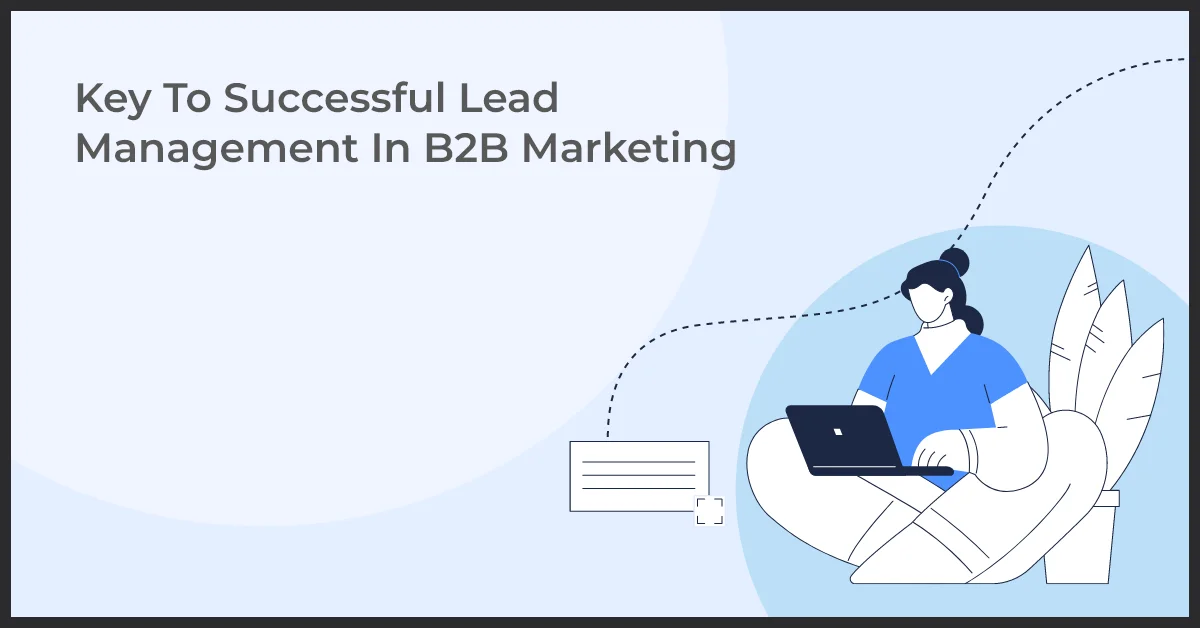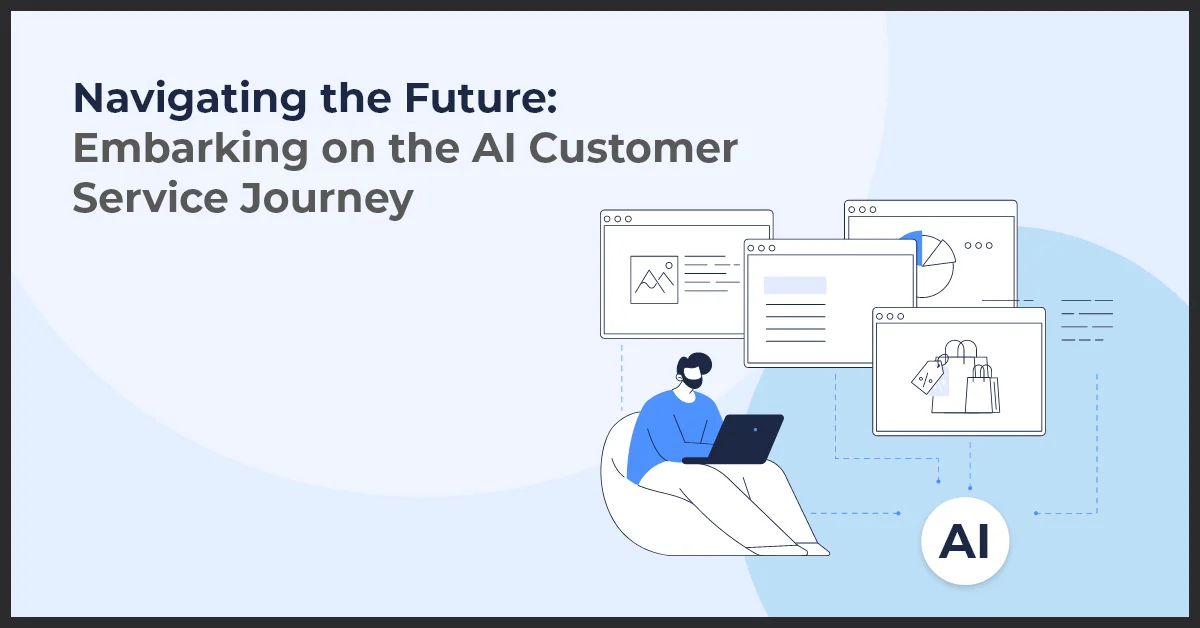Key To Successful Lead Management In B2B Marketing

Published on: May 27, 2020
Updated on: July 12, 2024
638 Views
- Digital Marketing
16 min read
In the world of B2B marketing, lead management is a crucial process that every business should prioritize. But what exactly is lead management in B2B marketing and why is it so important? In this article, we will explore the definition of lead management and delve into the significance of effective lead management for businesses.
“Productivity is never an accident. It is always the result of your persistence, intelligent planning, and focused efforts”
Paul J Meyer
B2B Marketing is quite different from B2C marketing. This primarily is due to the small number of buyers. It's important to understand that CAC in the B2B business is mostly higher than B2C marketing. Leads in the B2B marketing funnel are the most important resource for the organization. Hence, it is imperative for every successful marketing team to develop a comprehensive plan to manage their leads which will lead them to achieve maximum efficiency.
Definition of Lead Management in B2B Marketing:
Lead management in B2B marketing refers to the systematic processes and strategies employed by businesses to capture, nurture, qualify and convert leads into customers. It involves building relationships with potential prospects through effective communication, tracking their interactions, and guiding them through the sales funnel until they are ready to make a purchase.
Importance of Effective Lead Management for Businesses:
Effective lead management is critical for the success of businesses in the B2B marketing landscape. Here are a few reasons why:
- Higher Conversion Rates: Effective lead management ensures that businesses focus their efforts on high-quality leads, maximizing the chances of conversion and generating valuable sales opportunities.
- Improved Customer Relationship: By implementing proper lead management practices, businesses can build strong relationships with leads, understanding their needs and providing personalized solutions. This fosters trust and increases the likelihood of long-term customer loyalty.
- Cost Efficiency: By prioritizing proper lead management, businesses can avoid wasting resources on leads that are unlikely to convert. This results in cost savings and a more efficient allocation of marketing and sales efforts.
- Streamlined Sales Process: Lead management ensures smooth coordination between marketing and sales teams, enabling a streamlined sales process. By providing marketing-qualified leads to the sales team, businesses can improve productivity, reduce lead leakage, and accelerate the sales cycle.
Overall, effective lead management is the key to thriving in the competitive B2B marketing arena. By implementing strategic lead management practices, businesses can maximize their conversion rates, enhance customer relationships, optimize resource allocation, and streamline their sales process.
Marketers and Customer Understanding
Understanding target customers plays a crucial role in effective lead management in B2B marketing. By gaining deep insights into their needs, pain points, and motivations, marketers can tailor their strategies to generate and qualify leads more efficiently.
Importance of understanding target customers in lead management
When marketers have a clear understanding of their target customers, they can develop highly targeted messaging and content that resonates with their audience. This allows them to attract the right leads who are more likely to convert into customers.
By understanding their customers, marketers can also anticipate their pain points and needs, positioning their products or services as the ideal solution. This helps in eliminating any friction in the buyer's journey and persuading leads to move forward in the sales funnel.
Developing buyer personas for effective lead generation and qualification
Creating buyer personas is an essential step in the lead management process. Buyer personas are semi-fictional representations of ideal customers that include demographic information, motivations, pain points, and buying preferences.
- By developing buyer personas, marketers can align their lead generation efforts with the specific needs and preferences of their target audience.
- This enables them to create targeted content and offers that speak directly to the wants and challenges of their ideal customers.
- Additionally, buyer personas help in qualifying leads more effectively by identifying whether a lead matches the characteristics of an ideal customer.
Conducting market research to identify customer pain points and needs
Market research is a valuable tool to understand the pain points and needs of target customers. By conducting surveys, interviews, and analyzing relevant data, marketers can gather insights that shape their lead management strategies.
- Market research enables marketers to identify common challenges and pain points faced by their target customers.
- These insights can be used to develop targeted messaging and content that addresses and offers solutions to those pain points.
- Marketers can also uncover emerging trends, industry-specific needs, and customer preferences through market research, helping them stay ahead of the competition.
Lead Generation Strategies
Lead generation strategies play a crucial role in the success of any B2B marketing campaign. By implementing effective techniques, businesses can attract and capture potential leads, ultimately driving growth and revenue. Here are some successful strategies that can help businesses generate high-quality leads:
Content marketing as a lead generation strategy
Content marketing is an excellent strategy for generating leads. By creating and sharing valuable content, businesses can establish themselves as industry thought leaders and attract their target audience. Whether it's blog posts, white papers, or informative videos, providing valuable content helps businesses build trust and credibility with their potential leads.
Implementing search engine optimization (SEO) techniques for lead generation
Implementing SEO strategies is crucial in driving organic traffic to business websites. By optimizing websites for relevant keywords, businesses can increase their visibility in search engine results pages. This means more potential leads discovering their products or services and engaging with their brand. SEO techniques also ensure that the website's content is relevant and valuable to its target audience.
Leveraging email marketing for lead generation
Email marketing remains one of the most effective lead generation strategies. By building an email list of potential leads, businesses can regularly communicate with their audience, nurturing them and offering valuable content and promotions. Effective email marketing campaigns can drive conversions and keep businesses top of mind for potential customers.
Utilizing social media advertising for lead generation
Social media advertising provides businesses with a powerful platform to reach their target audience and generate leads. By leveraging the targeting capabilities of social media platforms, businesses can reach potential leads based on their demographics, interests, and behaviors. Social media ads can drive traffic to landing pages, where businesses can capture lead information and initiate the conversion process.
By implementing these lead generation strategies, businesses can attract a targeted audience, capture potential leads, and move them through the sales funnel for conversion. Each strategy offers unique benefits and when combined, can create a comprehensive lead generation approach for B2B marketing success.
Given below are the four master keys to unlock the most efficient lead management framework-
Lead Nurturing
If we efficiently work on funnel lead management by improving the CLTV even by 10% only at each level, the overall economic value of the funnel can be increased by 60%. This can only be achieved through lead nurturing at each level. Lead nurturing can be achieved by sending automated messages to your clients. Automated messages mean you need not manually pay attention to each requirement of the customer and the automated system will satisfy their needs.
Automated emails are also quite useful in upselling and cross-selling in B2B marketing since they ensure that targeted messaging reach customers as soon as it becomes clear that they may have an interest in additional products or services. Pushing a message at the right time and at the right place is the key to customer satisfaction.
Another important point is personalization and customization of the commutation at scale. For any organization, it is important to give a personal touch to their client relationship. Automation gives you tools to personalize the client communique and engage them irrespective of the region, language, age group, and other demographic factors.
Lead Qualification
In B2B marketing, various departmental teams are involved in the lead nurturing process. Marketing Qualified Leads (MQL) and Sales Qualified Leads (SQL) are examples of lead qualification. When a new lead enters the funnel, it is handled by the marketing team.
The marketing team drives the lead through product/service introduction, its USPs, how it stands ahead of the competition. The engagement level of the lead and understanding of their pain points helps progress the lead through the funnel. Once the lead reaches a certain scoring threshold, the sales team is introduced to the leads. This change of hands is subtle in nature and the sales function tries to drive the lead towards paid subscription.
In the automation process, it is critical to involve different teams to collaborate and start working together. An ideal marketeer will always know when and how to involve different teams within the lead funnel. They try to identify lead indicators for timely action and the appropriate message for the leads. An organized lead qualification system increases overall organizational efficiency.
Segmentation and Automation
Segmentation of leads refers to determining the effective leads who seem to move fast towards paid conversion. Lead Segmentation helps you decide, who are the effective leads that you can pay attention to make conversions. In broader terms, segmentation means sub-dividing your customer or the leads into small groups based on their source of generation, behavioral aspects, their requirements, and time spent in the lead funnel.
Because of these indicators, different content properties will be shared with the leads. The content properties include blogs, newsletters, e-books, and videos, etc.
Automation is the process where leads are sent emails and other communication through the automated system. This system is based on the segmentation of the leads we discussed above. Automation is achieved through Artificial Intelligence and software programs. It saves time for the marketing teams and simplifies the communication function.
Building a B2B marketing automation process could be complex, but there are many software programs available in the market which allow organizations to have their own set of rules and commands. A smart marketer uses automation for better targeting of leads.
Dynamic Content
It is said content plus context is the golden formula for successful lead management. In B2B marketing, dynamic content plays a major role as there are always more competitors in the market and there are a smaller number of buyers. There is no fixed formula to design effective content. However, we can design a framework where various content properties can be aligned with buyer personas and can be pushed during different stages of the buyer journey. When a prospect matches the criteria for your dynamic content, a variation of the content displays.
One can create content for each buyer persona keeping in mind their pain areas. For each stage, there could be a different format of content like Blogs, Images, E-books, User manuals, Discount Coupons, and videos. Dynamic content enables the marketeer to personalize the lead experience, display targeted communication to specific leads, and seamlessly nurture leads within the B2B marketing Funnel.
CRM Systems for Efficient Lead Management
The success of any lead management process relies heavily on the use of Customer Relationship Management (CRM) systems. These software solutions are designed to streamline and automate lead management tasks, ensuring a more efficient and organized approach to handling leads. Implementing CRM systems offers numerous benefits to B2B marketers looking to optimize their lead management efforts.
Importance of implementing CRM systems in lead management
CRM systems play a crucial role in lead management as they provide a centralized platform for storing, tracking, and analyzing lead data. With a CRM system in place, B2B marketers can effectively manage and prioritize leads, enabling them to focus their resources on high-value prospects. By implementing a CRM system, organizations can ensure that leads are not lost or neglected, resulting in improved lead conversion rates and increased revenue.
Selecting and integrating CRM software for lead tracking and monitoring
When choosing a CRM software for lead management, it is essential to consider the specific needs and requirements of your organization. Look for a solution that offers comprehensive lead tracking and monitoring capabilities, allowing you to capture and analyze key metrics such as lead sources, engagement levels, and conversion rates. Seamless integration with other marketing and sales tools is also crucial to ensure a smooth workflow and data synchronization.
Maintaining a centralized database accessible to sales and marketing teams
A centralized database is a cornerstone of efficient lead management. It allows both sales and marketing teams to access and update lead information in real-time, facilitating collaboration and ensuring everyone is on the same page. With a centralized database, teams can easily track lead progression, assign tasks, and communicate with each other, improving overall efficiency and reducing the chances of miscommunication or duplicate efforts.
Sales and Marketing Alignment for Conversion
In order to successfully convert leads into customers, it is crucial for sales and marketing teams to collaborate and be aligned in their efforts. This synergy between the two teams can significantly impact the conversion rate and overall success of a lead management campaign.
Importance of Collaboration and Alignment between Sales and Marketing Teams
The collaboration and alignment between sales and marketing teams are essential in ensuring a smooth lead management process. By working together, these teams can leverage each other's strengths and expertise to deliver targeted and effective messaging to potential customers.
Marketing teams possess in-depth knowledge about the target audience, market trends, and competitive landscape. They can develop compelling content and campaigns that attract and engage leads. On the other hand, sales teams have a deep understanding of the product or service and are skilled in nurturing leads and closing deals.
Establishing Shared Goals and Objectives for Effective Lead Handover
To foster collaboration and alignment, it is vital to establish shared goals and objectives between sales and marketing teams. These goals should be focused on lead conversion and revenue generation. By aligning both teams around a common purpose, there will be clarity and unity in the approach towards lead management.
Additionally, defining clear criteria for lead handover is crucial. This ensures that marketing qualified leads (MQLs) are passed on to the sales team at the right time and with the right information. The handover process should be seamless, with both teams understanding the criteria and working together to smoothly transition leads from marketing to sales.
Regular Communication and Feedback Loops for Smooth Lead Conversion
Effective communication and feedback loops between sales and marketing teams are essential for successful lead conversion. Regular meetings and discussions allow both teams to align their strategies, address any challenges, and share insights. This collaboration enables continuous improvement and optimization of lead management efforts.
Feedback from the sales team is valuable in refining marketing strategies and identifying areas for improvement. Conversely, marketing teams can provide valuable insights about lead quality, customer preferences, and market trends to enhance the effectiveness of the sales team's approach.
The combination of regular communication and feedback loops ensures that both teams are working cohesively towards the common goal of converting leads into customers.
Analytics and Reporting for Optimization
Analytics and reporting play a crucial role in optimizing lead management strategies. By using data analytics tools, marketers can measure the success of their lead management efforts and make informed decisions to improve their results.
Tracking key metrics is essential for evaluating the effectiveness of lead management in B2B marketing. These metrics include the lead conversion rate, which measures the percentage of leads that eventually become customers. By monitoring this rate, marketers can identify areas that need improvement and adjust their strategies accordingly.
Another important metric to track is the cost per lead. This metric helps marketers understand the overall efficiency of their lead generation and qualification processes. By analyzing the cost per lead, marketers can identify ways to optimize their budget allocation and increase their ROI.
Lead velocity is yet another significant metric to consider. It measures the speed at which leads move through the sales pipeline. By monitoring lead velocity, marketers can identify bottlenecks and areas for improvement, leading to a more efficient lead nurturing and qualification process.
Lastly, ROI (Return on Investment) is a critical metric for evaluating the overall success of lead management efforts. By calculating the ROI, marketers can determine the profitability of their lead generation and nurturing strategies, helping them allocate resources effectively and make data-driven decisions.
To achieve continuous improvement in lead management, it is crucial to rely on data-driven insights. By using analytics and reporting, marketers can gain valuable insights into their performance and identify opportunities for optimization. With these insights, marketers can refine their strategies, improve lead quality, and increase customer conversion rates.
In conclusion, analytics and reporting are powerful tools for optimizing lead management strategies in B2B marketing. By tracking key metrics and leveraging data-driven insights, marketers can continuously improve their lead generation, nurturing, and conversion efforts. With data as their guide, marketers can achieve greater efficiency and success in managing leads and driving business growth.
Continuous Improvement in Lead Management
Effective lead management is an ongoing process that requires a mindset of continuous improvement. Simply implementing a lead management strategy is not enough; it needs to be regularly evaluated and refined to ensure optimum results.
One key aspect of continuous improvement in lead management is evaluating the processes that are in place. Marketers must regularly assess whether the lead generation and qualification strategies are still effective in capturing qualified leads.
Market dynamics and customer preferences are constantly evolving, and it is crucial to adapt to these changes. By staying updated and proactive, marketers can ensure that their lead management processes align with the evolving needs and expectations of their target audience.
Conclusion
Importance of implementing effective lead management strategies in B2B marketing:
Effective lead management is the backbone of successful B2B marketing activities. It allows businesses to streamline their marketing efforts, optimize conversion rates, and ultimately drive revenue growth. By implementing efficient lead management strategies, businesses can effectively prioritize the most promising leads, nurture relationships, and ensure timely follow-ups. This not only boosts the efficiency of marketing and sales teams but also provides a better experience for potential customers.
Call-to-action: Encouraging businesses to prioritize lead management for success:
Don't let your leads slip away! Prioritizing lead management is crucial for the growth and success of your B2B marketing efforts. By investing in effective lead management strategies and utilizing tools like CRM systems, businesses can improve their lead conversion rates, increase customer acquisition, and ultimately drive more revenue. Start implementing lead management best practices today and see the positive impact it has on your business!
The above-mentioned functions can lay the foundation of a successful B2B marketing lead management system and can help marketers develop a new insight on how to handle their leads with precision. Need help orchestrating great B2B lead generation and management give drop us a line at info@growthnatives.com



